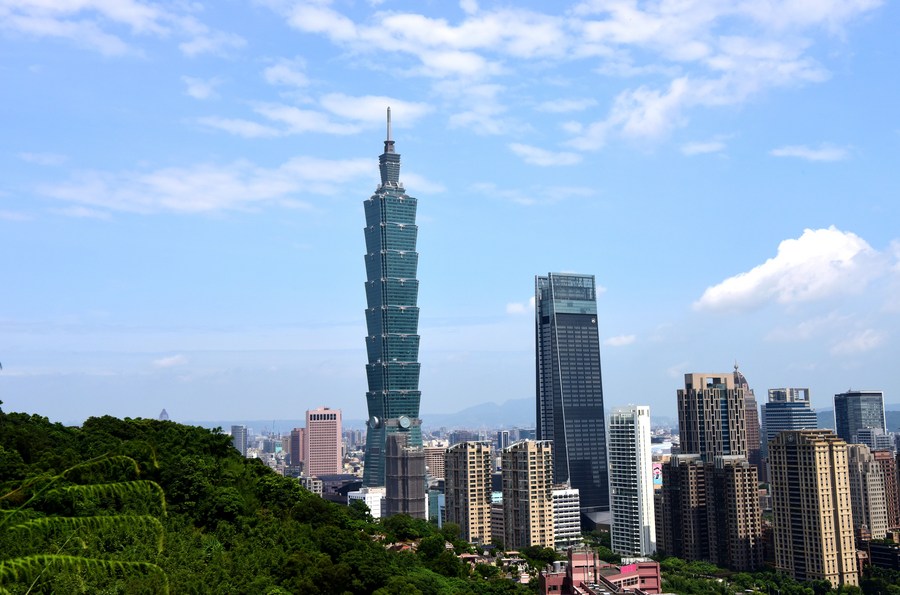Collection of U.S. actions inconsistent with words on China
BEIJING, Nov. 21 (Xinhua) -- At the international arena, Washington has long been well-known for its hypocrisy of saying one thing while doing another. As for Washington's policies on China, its actions stand in stark contrast to its words in the following aspects:

Photo taken on July 21, 2019 from Xiangshan Mountain shows the Taipei 101 skyscraper in Taipei, southeast China's Taiwan. (Xinhua/Zhu Xiang)
On Taiwan
In words:
The United States has clearly stated in the three China-U.S. joint communiques that it "recognized the Government of the People's Republic of China as the sole legal Government of China" and "acknowledged the Chinese position that there is but one China and Taiwan is part of China."
In a telephone conversation in June, U.S. Secretary of State Antony Blinken told Yang Jiechi, a member of the Political Bureau of the Communist Party of China (CPC) Central Committee and director of the Office of the Foreign Affairs Commission of the CPC Central Committee, that the United States adheres to the one-China policy and abides by the three Sino-U.S. joint communiques.
During a press briefing in February, the U.S. Department of State spokesperson Ned Price said that the United States supports the one-China policy.
In action:
The United States announced a 750-million-U.S.-dollar military sale to Taiwan earlier this year, and in 2020, Washington approved a total of 5 billion dollars in arms sales to the region.
U.S. vessels have repeatedly flexed their muscles to stir up trouble in the Taiwan Strait, threatening cross-Strait peace and stability and sending erroneous signals to "Taiwan independence" forces.
On Oct. 26, Blinken's clamor for Taiwan's "robust, meaningful participation throughout the United Nations system" once again crossed China's red line over the Taiwan question.
Washington has also concocted various bills regarding Taiwan, including the so-called Taiwan Relations Act. A handful of anti-China politicians are also seeking to pass a bill which calls on the U.S. State Department to submit a plan to help Taiwan regain its observer status at the World Health Organization.

Photo taken on Nov. 1, 2018 shows the Lujiazui area at sunrise in Shanghai, east China. (Xinhua/Fang Zhe)
On China's Development
In words:
Senior U.S. officials, including U.S. National Security Advisor Jake Sullivan, have said that the United States has no intention of containing China's development and will not engage in a "new Cold War."
In October, U.S. Trade Representative Katherine Tai said that the U.S. administration aims to build "truly fair international trade," noting that Washington's objective is "not to inflame trade tensions with China." She also proposed a "durable coexistence" between the world's two largest economies.
In action:
Under the pretext of national security, the United States has in recent years spared no effort to crack down on Chinese telecommunications provider Huawei and other Chinese hi-tech companies.
The current U.S. Congress has introduced more than 300 anti-China bills, and the United States has included more than 900 Chinese entities and individuals in various unilateral sanctions lists, which have severely disrupted the normal bilateral exchanges.

Photo taken on Sept. 30, 2021 shows the U.S. Capitol building in Washington, D.C., the United States. (Xinhua/Liu Jie)
On U.S. alliances and Asia policy
In words:
U.S. Vice President Kamala Harris said during her visit to Singapore and Vietnam in August that "our engagement in Southeast Asia and the Indo-Pacific is not against any one country, nor is it designed to make anyone choose between countries."
U.S. Ambassador to Indonesia Sung Kim said in September that AUKUS, a new trilateral security partnership between the United States, Britain and Australia, was not "directed at any particular country."
In action:
The United States has attempted to form exclusive cliques against China, such as the Quad, which groups the United States, Japan, India and Australia.
And in September, the United States, Britain and Australia announced the creation of the AUKUS pact and a plan to deliver a nuclear-powered submarine fleet to Australia.
The creation of AUKUS has raised concerns across the region. According to Mushahid Hussain Syed, chairman of Pakistani Senate's Defense Committee, the trilateral alliance was set up at the wrong time and for wrong reasons, because it is only sowing seeds of a new Cold War and new conflicts in the Asia-Pacific region, where peace, security and cooperation are what is exactly needed.
Photos
Related Stories
- Commentary: America's long tradition of "passing the buck"
- Chinese FM calls for opposing division through solidarity, promoting development through cooperation
- U.S., China must take real actions to avoid confrontation: Chinese ambassador
- U.S. flunks pandemic stress test: columnist
- Chinese ambassador meets with U.S. Assistant Secretary of State
Copyright © 2021 People's Daily Online. All Rights Reserved.










